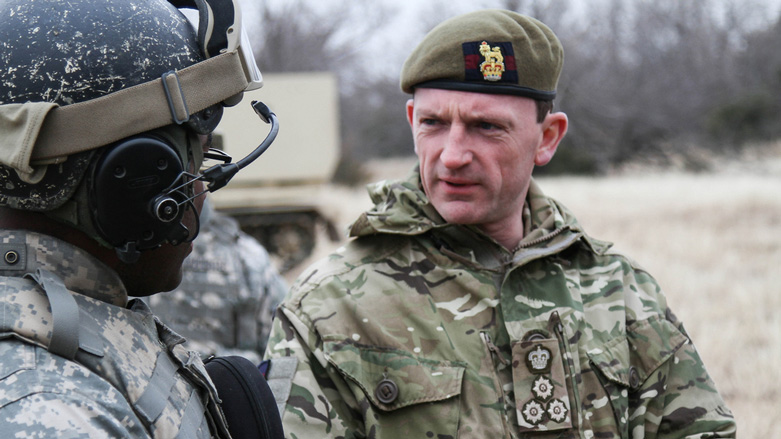Coalition: End of ISIS caliphate ‘does not signal the end of this campaign’

ERBIL (Kurdistan 24) – A British commander in the US-led coalition to defeat the Islamic State said in a statement released on Thursday that, although the militant group is almost territorially defeated, this does not mean that military operations against them are coming to a close.
“While ISIS is on the verge of collapse, and the end of the physical caliphate is at hand it does not signal the end of this campaign,” said Maj. Gen. Christopher Ghika, the Deputy Commander-Strategy and Information Combined Joint Task Force – Operation Inherent Resolve.
“ISIS continues to pose a threat to the security of the region, and we will pursue them until that threat is eliminated,” he continued.
The Kurdish-led Syrian Democratic Forces are soon expected to defeat the Islamic State in its last remaining pocket of territory in Syria. The group reportedly controls less than one square kilometer in the village of Baghuz in Deir al-Zor Province, which lies along the Iraqi border.
Mustafa Bali, head of the Syrian Democratic Forces' (SDF) media center, told Kurdistan 24 on Wednesday that his troops are attempting to evacuate civilians caught up in the fighting, saying, “We are trying to find ways to avoid civilian casualties.”
According to the Syrian Observatory for Human Rights (SOHR), almost 240 Islamic State members have just surrendered to the SDF and the US-led coalition.
Thursday’s coalition statement declared that the SDF is detaining fighters now attempting to escape by blending into groups of civilians fleeing the area.
“Amongst those arriving to be screened are the wives of ISIS fighters, some of whom sustained gunshot wounds while fleeing from ISIS,” said Ghika. “These utterly despicable and ghastly acts further illustrate their barbaric nature and desperation as ISIS struggles to hold onto their remaining territory.”
On Feb. 1, Kurdistan 24 interviewed the German teenage wife of an IS fighter who fled the Baghuz area. Leonora, aged 19, said she traveled to Turkey to join up with the militant who moved to Syria and married him in Raqqa.
However, now she says she regrets the decision.
“I wake up and I see that I was naive,” she said, and that she had become ”part of terrorists.”
A pregnant British teenager who traveled to Syria and joined the Islamic state at age 15 told the Times of London on Wednesday that, although she wanted to return home, “I don’t regret coming here.”
Sanharib Barsoum, the deputy head of the Syriac Union Party in Syria, tweeted on Wednesday that the US-led coalition should, instead of withdrawing, prepare for a second phase in the war against the Islamic State, focusing on the threat of sleeper cells among the civilian population.
“This requires support and training for the internal security forces and border security forces, and the withdrawal now means to leave the area for unknown threats. And the world, in this case, would not be safe.”
Another local official, Abdul Hamid al-Muhabash, the co-chair of the Democratic Autonomous Administration (DAA) in northeastern Syria, made a similar argument.
He told Kurdistan 24 in a recent interview that the Islamic State’s caliphate might have “vanished, but ISIS as an ideology and mentality in Deir al-Zor, Raqqa, and, Manbij will stay.”
Muhabash argued that future risks will come in the shape of an insurgency run by underground networks and called on the US-led coalition to provide “intelligence in order to remove sleeper cells and dismantle the threat of the terrorist organization.”
Editing by John J. Catherine
